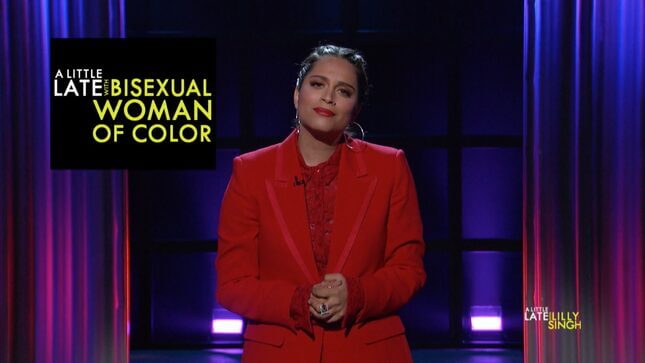

Much like red carpet interviews or going to the dentist, late night television has become something of a necessary evil (though the “necessary” qualifier is up for debate.) Stephen Colbert, Seth Meyers, Trevor Noah, John Oliver, James Corden, Jimmy Kimmel and Jimmy Fallon—or as I like to refer to all of them: the Jimmys—have laid claim to the nighttime talk show slots for years, inadvertently embodying all that is wrong with the format: it’s antiquated, formulaic, and so obviously dominated by white men (Noah’s the exception, but his show is lackluster, too.) So when Lilly Singh, veteran YouTuber, took on a new gig as the first ever bisexual Indian Canadian host of a late-night talk show, NBC’s A Little Late with Lilly Singh, there was reason to be excited. Her’s is a voice that’s gotten no space on primetime—there’s a reason she found and built her celebrity online—and judging by her first week of shows, she’s become stifled by the responsibility. That doesn’t mean it’s not a fun watch.
Singh’s show doesn’t differ much from the traditional late night format except in small, budgetary ways, which seems like a missed opportunity. In lieu of the Roots, Reggie Watts, or some other band of incredible instrumentalists, Singh has a DJ named Daniel. Instead of a show with two scheduled guests and a live act each night, Singh’s show differs from day to day—in her first week, she switched up from one guest to sometimes three, and there was one musical act: a performance by Australian boy band-turned-pop rock group 5 Seconds of Summer. Like other shows, her interviews are interspersed with comedic digital shorts, but they’re recycled throughout the week. Both Wednesday and Thursday night’s episodes included an unfortunately unfunny gag about FitBits for brown and black people, a response to a recent study that found some pedometers don’t accurately track the heart rate of people of color. The most obvious difference is that Singh’s show, unlike her male competition, is jam-packed with the ham-fisted progressive politics of social media activism. She opens with jokes about the “fear of white America,” when they realize they hadn’t tuned into “Slumdog Millionaire” while cheerleading her own success as the pinnacle of representation. She doesn’t dig any deeper. In fact, so far she’s sacrificed humor for entry-level wokeness.
-

-

-

-

-

-

-

-

-

-

-

-

-

-

-

-

-

-

-

-

-

-

-

-

-

-

-

-

-

-

-

-

-

-

-

-

-

-

-

-








































